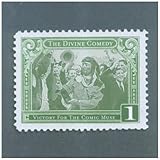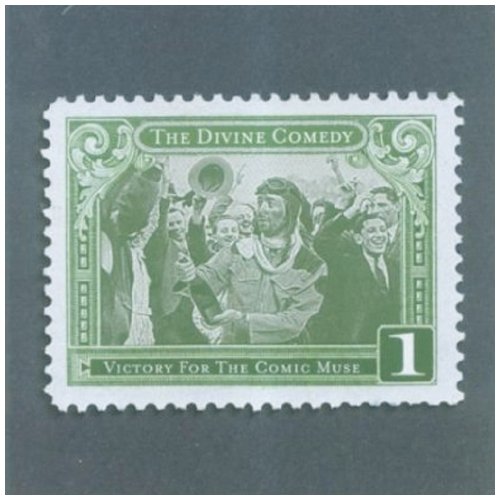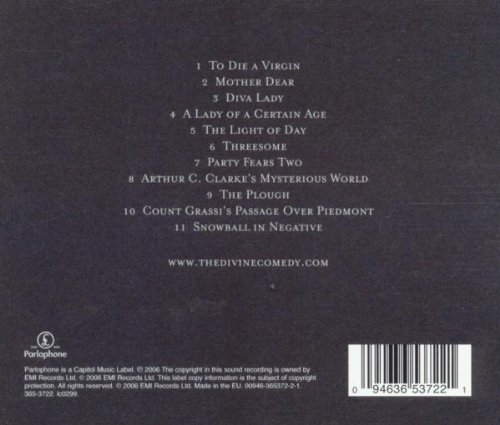The Divine Comedy Album: «Victory for the Comic Muse»

- Customers rating: (4.5 of 5)
- Title:Victory for the Comic Muse
- Release date:2006-08-01
- Type:Audio CD
- Label:Parlophone
- UPC:094636537221
- 1 To Die a Virginimg 3:40
- 2 Mother Dearimg 3:48
- 3 Diva Ladyimg 4:19
- 4 A Lady of a Certain Ageimg 5:48
- 5 The Light of Dayimg 4:25
- 6Threesome
- 7 Party Fears Twoimg 4:11
- 8 Arthur C. Clarke's Mysterious Worldimg 3:59
- 9The Plough
- 10 Count Grassi's Passage over Piedmontimg 3:28
- 11 Snowball in Negativeimg 4:41
I've never quite understood The Divine Comedy because they seem so surreal to me. How can a band that first formed in the early nineties sound this classic and seem so legendary in the slightly over a decade they've been around? When Nick Hannon and co. first emerged with Fanfare for the Comic Muse in the summer of '90, no one who had heard them then would forget the remembrance in the charmingly naïve quality in music the world was missing for so long since the legendary acts of the `80s had passed. Although a few chords were used, production was basic and the music sounded more R.E.M. than the Divine Comedy we know of today, there was no denying that first EP would lead to much bigger, better things for The Divine Comedy.
1997's Casanova was the breakthrough album for the band, with lead single "Something for the Weekend" carrying the band to a greater commercial success than they've ever known - the mass audience then being a lot more receptive (at that time most likely due to the success of Pulp) to what has since 1993 (with Liberation) been their signature sound. And year 2006 sees Nick Hannon return with the emotive Victory for the Comic Muse (the title, which suggests a tribute to that first often deleted EP).
First track, "To Die a Virgin" effectively sums up what The Divine Comedy are about before you start listening to the rest of the album. An elaborate tune, bucket loads of wit, and a charm in deliverance all in all make up what's so special about this band - and what always will be. "Mother Dear" is a realization of Nick Hannon of everything his mother meant for him, but never realized because of his own undoings. Such a sweet, joyful song you won't be able to take the smile off your face when listening to it. Then comes "Diva Lady", a seemingly happy song with its chirpy tune but lyrics which describe, well, essentially a diva: `She's a Diva Lady / She's a hopeless case / She needs extra makeup for her extra face / She's a hopeless case'. This is one of those songs you'll absolutely love on first listen. Next is the slower paced "Lady of a Certain Age", Neil Hannon gets all melodramatic about a posh lady in her sixties, whiling her time in the Mediterranean with not much meaning in her life, hoping a young man would buy her a drink. I'm sure Hannon will. "Light of Day" follows the same road of nostalgia and perhaps regret, which ends up being painfully successful in hitting a raw nerve - which I suppose shows how effective Hannon still is. "Threesome", a sunny one minute-ten second piano solo follows to introduce the cover, "Party Fears Two" - which I prefer to the original by The Associates because it seems so much more perfect for Hannon's sweet, soulful voice. "Arthur C Clarke's Mysterious World" keeps the tempo up for preparation to "Plough", which is yet another bleak, depressing song about a dull, difficult life of an office boy in a firm full of treacherous people (accountants, in this instance) - which everyone can relate to from time to time. "Count Grassi's Passage over Piedmont" follows, with its Bono-like commentary behind the singing to only bring the album to an end with "Snowball In Negative", which ends Victory on a bittersweet note.
I will go as far as to say Victory may be Divine Comedy's best release to date: From start to finish, it is a wonder that eleven tracks that all sound like they could be released as singles to massive success would be packaged on one album itself. Every song is extremely special, each track being crafted with such subtle wit and self-effacing grandiosity at the same time that at this moment in time, only The Divine Comedy would know how to do it without seeming to contradict themselves.
The band were mightily named after an Italian poem by Dante Alighieri, which is widely considered the last great work of literature of the Middle Ages and the first great work of the Renaissance, and one of the greatest of world literature. And even considering that, they've certainly lived up to their name. From their promising first EP to Victory for the Comic Muse, Nick Hannon, the mastermind of The Divine Comedy, is indeed the music world's version of Dante Alighieri: A living genius of our time.
Being a fan of The Divine Comedy since they released Casanova in 1996, I was really looking forward to their latest album. Much like a lot of previous releases by The DC, this album takes a few listens to fully appreciate it. When I first listened to it, I was disappointed with most of the early tracks and didn't listen beyond track 7. However, repeated listens have definitely added a great deal to my enjoyment of this collection. Track-by-track:
1. To Die A Virgin - Amusing lyrics, but the melody doesn't do anything for me. Opinion seems to be very divided on most of the tracks here, this being no exception. It sounds a bit flat to me.
2. Mother Dear - An unusual country track with a catchy melody, but a far too repetitive chorus. Musically it's great, but the constant repetition of "Mother Dear" quickly becomes tiresome.
3. Diva Lady - Not bad, but hardly the strongest of melodies penned by Neil Hannon. Annoyingly it sticks in your head - I'd rather it didn't!
4. A Lady Of A Certain Age - Beautiful melodies, wonderful instrumentation, and moving lyrics. I've always liked Hannon's voice, but this is the kind of track his singing is best suited to. Stunning.
5. The Light Of Day - A bright, upbeat melody, again with some beautiful instrumentation - strings and harpsichord really add to the classical rock style that the DC have always done so well.
6. Threesome - A charming 1 minute piano instrumental that provides a good break in the middle of the album.
7. Party Fears Two - Elsewhere I've hear people calling The Plough pompous; if any track sounds pompous, it is this one. I haven't heard the original but the strings are overdone for a riff that isn't all that special. The chorus is better than the verse, but this just sounds out of place here.
8. Arthur C. Clarke's Mysterious World - This one's quite odd. I didn't expect to like it at all but it really grows on you. Great lyrics, a very enjoyable melody and plenty of decoration around the various melodies. Very well composed indeed.
9. The Plough - As I mentioned earlier, I couldn't disagree more with the notion that this track sounds pompous. It's an absolute masterpiece. A wonderful build-up in each verse and throughout the track. A similar feel to The Certainty of Chance or Freedom Road, this is one of the best tracks I have ever heard from the DC.
10. Count Grassi's Passage Over Piedmont - The opening melody links well from The Plough. Great melodies throughout, an unusual mix of spoken/sung lyrics, not dissimilar to The Booklovers - but much easier to hear more than a few times over. Very special, and unique!
11. Snowball In Negative - Yet again, the orchestral arrangements are superb. Interesting contrast between the vocal sections and the piano solos, showing that Threesome wasn't such an anomaly after all. The ending is a little unexpected and slightly drawn out, but this track wraps up the album well.
Apart from the first few tracks, this is possibly the best DC album I've ever heard. It's right up there with Promenade and Fin De Siecle and is a welcome reminder that Hannon is highly unlikely to lose his touch anytime soon. Beautiful!
This is a great album. We start of with To Die a Virgin, which is humorously described as the worst possible fate. A comical mixture of happy-musical vehicle and morbid theme. Next it's the more accessible, Mother Dear, about first realising that one's mother 'is a person in her own right'. The song moves on to the 'being adopted' theme - deconstructing heavy issues by presenting them with mock seriousness and hill-billy banjo's in the background! Diva Lady opens with a superb rhythm/bass/piano groove - and you just know what the subject matter is going to be like: yes, it's a kind of David Bowie style commentary on a Diva's 'special needs'. Excellent chorus - 'she's got 30 people in her entourage just in case her ego needs a massage'. Superb track! Makes you wonder what we're going to get with A Lady of a Certain Age. This track is about the rich-trappings and imprisonments - and hence melancholy and nostalgias - of being a higher-class lady - 'to keep your sanity a nanny was employed'. 'That's what they they did in those days' suggests some kind of period-piece like Suzan Howatch's Penmaric. The Light of Day is about melancholic reflection upon a past relationship through finding an old photo. This is vaguely reminiscent of The Smiths - except with better musicianship. Threesome is a very short track - the instrumental nature of which both leaves the listener to their imagination and sounds like the music to a silent Charlie Chaplin film. Party Fears Two has an odd military-drum and brass um-pah sound - which forms the backing to what seems to be an absurd description of pre-party fears based on how the booze might trash one's manners and etiquette. Arthur C. Clarke's Mysterious World draws parallels between the said BBC programme and the narrator's woman friend. Other parallels include the woman in the 80s who was allergic to everything, the Baltic Sea, the expanding universe, uncharted territory, and so on - the point being to liken his woman to all that is completely baffling. Yet, at least she is 'lovely as could be'. Next up it's a Russian-sounding track called The Plough - about a farmer's boy going to the city. He starts as an office-boy, but rises through the firm - only to discover company corruption, which he rejects to 'plough his own furrow'. This includes listening to the local preacher's message of hell-fire, which he finds morally unacceptable as well. Guess he'll have to plough his own furrow! Count Grassi's Passage Over Piedmont is like a drug-induced account of an ethereal trip through a European Summertime by balloon - possibly the most intellectual track yet and a favorite of mine. Snowball in Negative concludes the album with a truly melancholic comparison between life slowly ebbing away, a snowball in negative (i.e. rolling on but getting smaller instead of bigger (if only!)), and failing to give up smoking, where the way the cigarette burns down also forms a parallel.
I suppose there's something of Monty-Python in The Divine Comedy. At one level it's excellent, correctly identifying the absurdities of life with a certain intellectual rigour. However, one wonders whether the attempt to find meaning in life is prematurely shelved in the Morrisey-like indulgence of self-pitiousness - which of course is also mocked and so can't be that bad can it? It's so true of the British that when it comes to the truly 'deep' thought that one needs to dig oneself out of nihilism - whether melancholic, humorous, or both - we just leave it to the Europeans and have another Pims. Afterall - to sacrifice one's world-weariness - well, it just isn't done my dear boy.
On a musical note, electric and double-bass player Simon Little has recently appeared on an altogether more hopeful and just as musically brilliant project with new senstation, Julie McKee - alongside Nigel Price from the James Taylor Quartet. The album in question is called, 'What a Woman Shouldn't Do' - which I prefer even to 'Victory for the Comic Muse'! You can find the truly superb 'What a Woman Shouldn't Do' at Amazon.co.uk. My advice: buy that first, and then come back to The Divine Comedy for a comparison.
Lyrically 'A Victory for the Comic Muse' is almost definitely Neil Hannon's finest acheivement to date, and that is really saying something. The pithy nature of the opening track 'To Die A Virgin' shows the mood in which this album means to continue. After the somewhat more sombre 'Regeneration' and the sporadically amusing 'Absent Friends', Hannon is still firing verbal quips and literary references to beat the band.
The albums fourth and perhaps most notable track, 'A Lady Of A Certain Age' is one that lives long in the memory. Like the album as a whole, it is lyrically as good as anything the band has produced. Even in songs such as this and 'The Plough' when he is seemingly leaning more towards more serious subject matter. It is always in a tongue in cheek fashion.
Some saw 'Regeneration' as a dip in form and 'Absent Friends' as the recovery for The Divine Comedy. If 'Absent Friends' was the recovery then 'Victory for the Comic Muse' is surely the crowning glory of The Divine Comedy's work to date.


